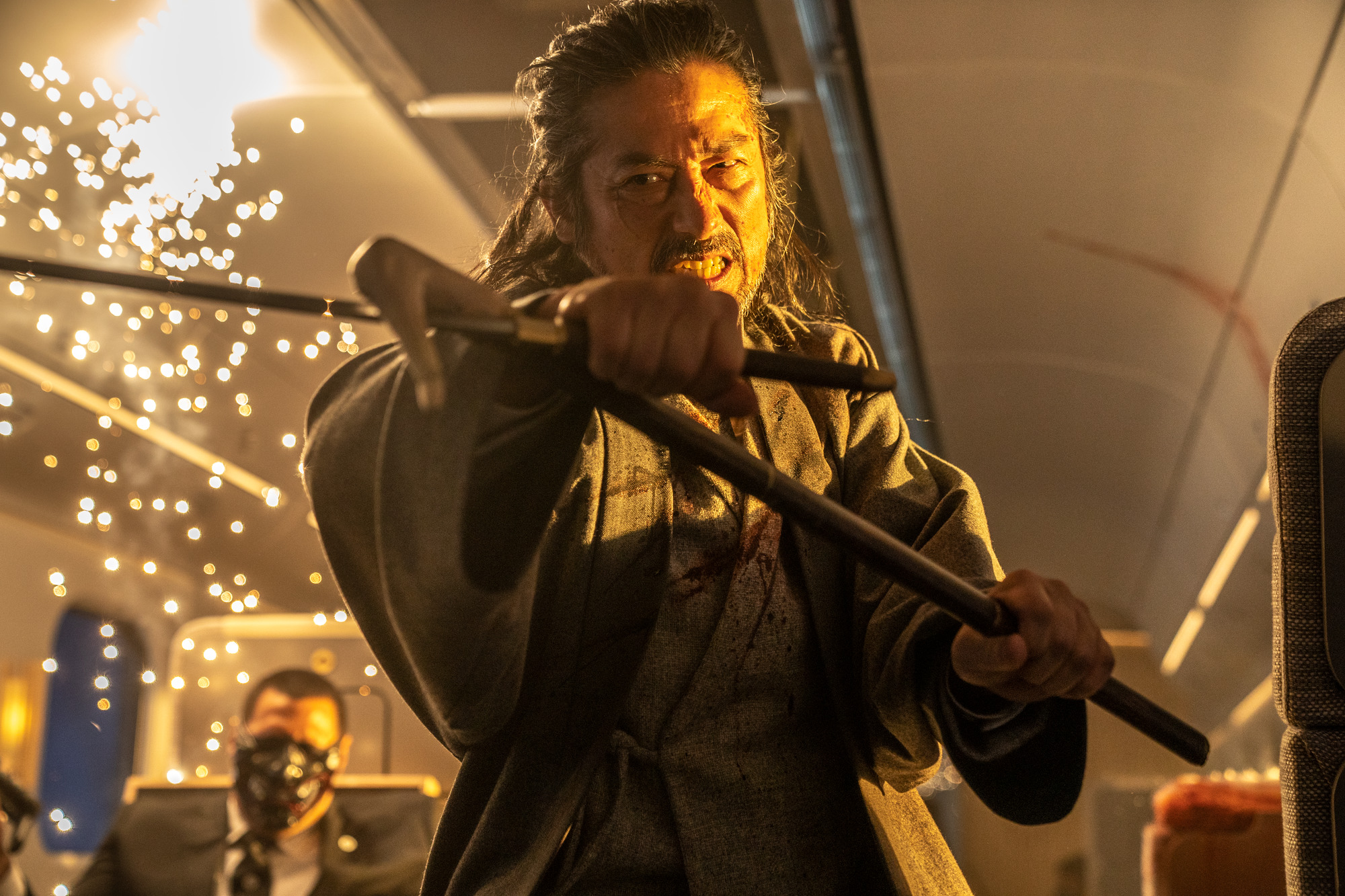You know an action movie’s bad when it saps your will to live. Bullet Train, directed by David Leitch and adapted from Kotaro Isaka’s 2010 novel Maria Beetle—is clearly designed to be pure, visceral entertainment, screaming fun! at every turn. But it’s a shrill, razor-shredded mess, a fringy assemblage of action, cartoony violence, and allegedly snappy dialogue that has the soporific effect of white noise. This is proof that too much lousy action is worse than no action at all.
Brad Pitt stars as one of many largely uninteresting hit-persons rattling around on Japan’s high-speed you-know-what as it whirs from Tokyo to Kyoto. There are five of these killers aboard, if you’re counting, which is at least one thing that might get you through the movie’s interminable two-hour runtime. Joey King’s Prince, decked out in a hot-pink pleated-skirt combo that’s half Jackie Kennedy, half Harajuku schoolgirl, is a fierce tootsie with a handgun stashed in her tiny backpack. Tangerine (Aaron Taylor-Johnson) and Lemon (Brian Tyree Henry) are twin brothers tasked with retrieving the kidnaped ne’er-do-well son of a shadowy crime figure known as White Death, though their half-exacting, half-bumbling modus operandi—not to mention their persistent cartoon-squirrel arguments—keep tripping them up. Zazie Beetz is the Hornet, a wily killer whose weapon of choice is a poisonous snake. A sixth player, the Wolf (Benito A Martínez Ocasio, aka Bad Bunny), enters the fray as part of a revenge subplot involving the venom of said snake. And an angry dad, Kimura (Andrew Koji), seeks the person or persons who pushed his young son off a roof. The kid miraculously survived, but lies comatose in the hospital, and Kimura’s father, known as the Elder and played by the marvelous Hiroyuki Sanada, has urged him to redress this atrocity.

To describe these characters even nominally makes them sound a lot more fun than they are. Pitt is supposedly the movie’s anchor. As Ladybug, an imperturbable, stonerish gun-for-hire, his exquisitely lanky I-don’t-care hair tucked under a dopy bucket hat, he’s fun to watch for about five minutes. But his presence in the film is oddly muted, as if he’d just barely mustered the energy to roll out of bed and show up. In the sphere of roiling discontent known as the internet, the filmmakers have been criticized for whitewashing the source material; all the assassins in Isaka’s novel are Japanese. On the one hand, the casting of big Hollywood stars is the only way to get big Hollywood movies made. Then again, of all the performers in this sad, futile exercise, only Sanada commands attention: he appears briefly at the beginning, and in a few small moments in between, but his presence at the end jolts the movie into something resembling life. He’s regal, an action star with class, and he’s the one silken thread in this tattered monstrosity.
Read more reviews by Stephanie Zacharek
Leitch is a longtime stunt performer and choreographer who has turned to producing and directing fairly recently: his three chief credits are Atomic Blonde, Deadpool 2, and Fast and Furious Presents: Hobbes and Shaw. (He also co-directed the first—and fabulous—John Wick movie with fellow stunt veteran Chad Stahelski.) At this point, you could characterize him as a specialist in schlocky entertainments made with big budgets. But schlocky shouldn’t be synonymous with carelessly bad. Bullet Train has a style all right: in an apparent attempt to mimic Tarantino’s affectionate use of deep cuts, the movie’s oh-so-cleverly curated vintagey soundtrack includes both a chipper Japanese cover of the Bee Gees’ “Staying Alive” and Kyu Sakamoto’s 1963 international megahit “Sukiyaki.” And its zig-zaggy cutting and deployment of blood-spurting arteries and the like also nod to Tarantino, or perhaps more aptly to his friend and sometime filmmaking accomplice Robert Rodriguez. But the energy behind these now-classic action-movie mechanics feels forced and overthought, rather than casually thrilling. Perversely, Bullet Train’s frenetic desire to stimulate is exhausting by itself. More enervating than energizing, this is the Sleepytime Tea of action movies.
More Must-Reads from TIME
- Cybersecurity Experts Are Sounding the Alarm on DOGE
- Meet the 2025 Women of the Year
- The Harsh Truth About Disability Inclusion
- Why Do More Young Adults Have Cancer?
- Colman Domingo Leads With Radical Love
- How to Get Better at Doing Things Alone
- Michelle Zauner Stares Down the Darkness
Contact us at letters@time.com